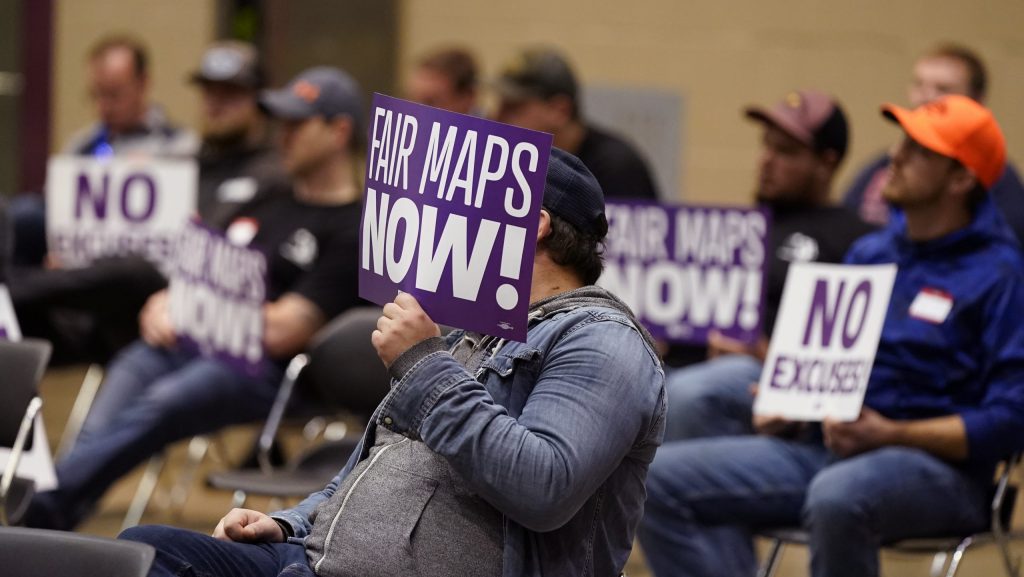Deadline looming for Redistricting Commission to fix Detroit districts
Russ McNamara, Colin Jackson February 1, 2024The commission purposely spent its time drawing the new drafts trying to avoid any mention of race until hearing an analysis from its Voting Rights Act counsel on Monday.

Protesters attend a meeting of the Michigan Independent Citizens Redistricting Commission on Oct. 21, 2021, in Lansing, Mich.
Six draft state House district plans advanced to a public comment period at Wednesday’s Michigan Independent Citizens Redistricting Commission meeting.
The group is redrawing a handful of metro Detroit House districts after a federal court found the old maps were predominantly drawn based on race, in violation of the U.S. Constitution’s Equal Protection Clause.
The commission purposely spent its time drawing the new drafts trying to avoid any mention of race until hearing an analysis from its Voting Rights Act counsel on Monday.
At that meeting, its lawyers advised the commission to do its best to create at least 11 Wayne County districts where minority voters have a fair chance at electing their preferred candidate during a primary election.
The commission received the go-ahead from the body’s legal counsel to start considering race while making tweaks to the analyzed maps to meet Voting Rights Act requirements.
It’s something Commissioner Brittni Kellom noted the group felt uncomfortable with.
“Folks are off camera, they’re not talking because we don’t know what this process is and for some of us who have drawn before, this feels dangerously close — like I can feel the tension across the screen — as to what this process was before,” Kellom said while asking attorneys to give clear and concise advice to the commission.
The attorneys responded by saying it would be extremely difficult for the commission to proceed at this point without using racial data in some form.
Only one of the maps advanced to public comment Wednesday, known as Daisy 2, met the 11-district goal outright.
After hours of discussion, the commission voted to send all the other maps under consideration to public comment regardless. The group is still working on tweaking others to include more maps that meet its lawyers’ Voting Rights Act guidance in the public comment pool.
Unlike the other maps advanced, the Daisy 2 plan only adjusted the seven districts that the court ordered the commission to redraw. The rest go beyond the scope of the court’s decision.
That includes the Spirit of Detroit plan, which the commission has generally discussed in a positive light. The version of the map advanced to public comment would amend eight state House districts left standing by the court decision, including House District 13 — currently slated for a special election this April.
The Spirit of Detroit plan only had 10 so-called opportunity districts, as described by the commission’s Voting Rights Act counsel.
A reluctant first try to add more, however, only marginally improved the map by that measure.
Commissioner Anthony Eid said it came at the expense, however, of other criteria, like keeping communities of interest together.
“While this may have helped, let’s call it 10.5 or something on the VRA measure, I certainly think it made a significant downgrade in the COI consideration,” Eid said. “I mean I certainly think it’s — from a community standpoint, it’s worse.”
Eventually, the commission took more stabs at bringing the other maps more into compliance with its VRA counsel’s advice.
Commission Chair Cynthia Orton laid out the stakes succinctly.
“If we don’t try to comply with the Voting Rights Act, we’re basically saying, ‘Take the Special Master’s map.’” Orton said, in reference to a court-appointed expert who’s working on backup maps for the court to choose, should the commission fail.
Whatever tweaks the commission wishes to make will need to be finished by Friday’s deadline for maps to be published for the public comment period.
Trusted, accurate, up-to-date.
WDET strives to make our journalism accessible to everyone. As a public media institution, we maintain our journalistic integrity through independent support from readers like you. If you value WDET as your source of news, music and conversation, please make a gift today.
